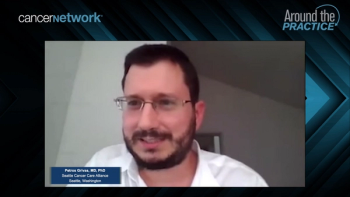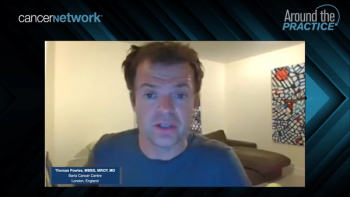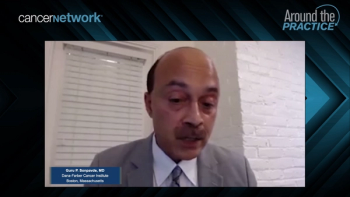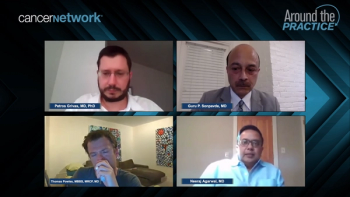
Petros Grivas, MD, PhD; Guru P. Sonpavde, MD; Thomas Powles, MBBS, MRCP, MD; and Neeraj Agarwal, MD, comment on the role of biomarker testing and its impact on the patient selection and approach to treatment for advanced urothelial carcinoma.

Your AI-Trained Oncology Knowledge Connection!


Petros Grivas, MD, PhD; Guru P. Sonpavde, MD; Thomas Powles, MBBS, MRCP, MD; and Neeraj Agarwal, MD, comment on the role of biomarker testing and its impact on the patient selection and approach to treatment for advanced urothelial carcinoma.

Experts in bladder cancer discuss when it’s appropriate to use avelumab maintenance therapy both with and without progression of disease in advanced urothelial cancer.

Petros Grivas, MD, PhD, presents the case of a 78-year-old man with PD-L1+ metastatic urothelial carcinoma, and the panelists share insight on their treatment approach for the given patient.

Thomas Powles, MBBS, MRCP, MD, reviews data and results from the phase 3 JAVELIN Bladder 100 trial for patients with locally advanced or metastatic urothelial cancer.

Petros Grivas, MD, PhD; Guru P. Sonpavde, MD; Thomas Powles, MBBS, MRCP, MD; and Neeraj Agarwal, MD, provide insight on how they approach the patient selection of maintenance therapy in advanced urothelial carcinoma.

Experts in bladder cancer comment on the role of PD-L1 testing in the frontline setting for advanced urothelial cancer and its impact on the use of up-front carboplatin or immunotherapy.

Petros Grivas, MD, PhD; Guru P. Sonpavde, MD; Thomas Powles, MBBS, MRCP, MD; and Neeraj Agarwal, MD, share their approach to frontline therapy for patients with advanced urothelial carcinoma and consider the impact of cisplatin eligibility.

Bladder cancer experts discuss the importance of detecting early signs and symptoms leading to the diagnosis of advanced urothelial cancer.

Neeraj Agarwal, MD, leads the discussion on the typical patient presentation and major risk factors for urothelial cancer.

This video reviews new studies examining the genetic drivers of three rare genitourinary cancers: von Hippel-Lindau disease, advanced papillary renal cell carcinoma, and penile cancer.

Since the development of first-line cisplatin-based combination chemotherapy with methotrexate, vinblastine, doxorubicin, and cisplatin almost 3 decades ago, there have not been major advances in the treatment of this disease.

Occult distant micrometastasis at the time of radical cystectomy leads predominantly to distant failures in patients with locally advanced muscle-invasive transitional cell carcinoma of the bladder. Cisplatin-based combination chemotherapy enhances survival in patients with metastatic urothelial cancer. Studies evaluating adjuvant chemotherapy have been limited by inadequate statistical power. However, randomized clinical trials have demonstrated a survival benefit for neoadjvuant cisplatin-based combination chemotherapy, which should be considered a standard of care. In addition, neoadjuvant therapy may assist in the rapid development of novel systemic therapy regimens, since pathologic complete remission appears to be a powerful prognostic factor for long-term outcomes. Patients who are either unfit for or refuse radical cystectomy may benefit from neoadjuvant chemotherapy with or without radiation to enable bladder preservation.